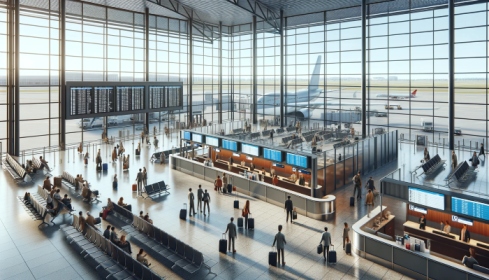Friday, August 30, 2024 The recent analysis indicates that the global market for travel technology, valued at $9.4 billion in 2022, is anticipated to escalate to $21 billion by 2032. This growth represents a compound annual growth rate of 8.
6% over the decade. The comprehensive study delves into various market aspects including emerging trends, key market segments, potential investment opportunities, the value chain, regional market behaviors, and the competitive environment. Market expansion is anticipated due to several drivers such as the adoption of voice command technologies, increasing prevalence of contactless payment methods, and the extensive use of artificial intelligence (AI).

The forecast period is also expected to see a surge in demand for contactless interfaces, presenting lucrative opportunities. Nevertheless, the substantial initial costs associated with deploying these technologies could pose a constraint to growth. Travel technology encompasses an array of tools, software, systems, and platforms used within the travel and tourism sectors to optimize and streamline travel processes from planning to execution.
This technology includes online booking systems, travel reservation systems, mobile apps, travel websites, global distribution systems (GDS), and software for managing travel logistics and data analysis. These tools aim to enhance the travel process, offering benefits to travelers as well as service providers like airlines, hotels, travel agencies, and destination management organizations. These technologies integrate functionalities like real-time notifications, personalization features, and integrated payment solutions, all designed to simplify the travel experience.
They provide travelers with easy access to essential information, allow customization of travel based on individual preferences, and facilitate smooth transaction completion. With the global increase in broadband internet and digital payment solutions, companies specializing in travel technologies are poised to redefine how travel planning, researching, purchasing, and booking are conducted. This transformation is expected to benefit various stakeholders such as online travel agencies, ride-sharing services, travel inspiration portals, and travel IT infrastructure providers.
The long-term evolution is set to make travel more accessible and affordable, spurring ongoing innovation and growth in the travel and tourism sector. Impact of COVID-19: The pandemic significantly accelerated the adoption of contactless technologies, crucial for minimizing physical interactions and reducing viral transmission risks. This trend is likely to persist, underlining safety and hygiene in travel.
The industry rapidly embraced technologies for contactless check-ins and payments. Health and safety measures became integral to travel operations, with technology being central to their implementation. Moreover, travel technology proved vital during the pandemic, aiding in handling disruptions, cancellations, and rescheduling.
Technologies like AI-driven customer service and messaging platforms were instrumental in keeping travelers informed. The crisis also fast-tracked the digital shift in the travel sector, with increased investments in e-commerce platforms, mobile apps, and data analytics to better adapt to changing traveler preferences. Regional Insights: In 2022, North America was the leading market, contributing nearly one-third of the global revenue, with expectations to maintain this position through 2032.
This is supported by the rising integration of metaverse technologies like chatbots, augmented reality, and virtual reality in the travel sector. Conversely, the Asia-Pacific region is projected to experience the fastest growth with a CAGR of 12.1%, driven by the proliferation of e-commerce platforms venturing into travel services.
Application Insights: The travel industry sector held the dominant market share in 2022, facilitated by the increasing adoption of automated booking and payment tools that allow online, agent-free bookings. The tourism industry sector is poised for the quickest growth, forecasted at a CAGR of 10.8%, fueled by applications that assist with travel planning and real-time updates.
Component Insights: The platform component led the market in 2022, owing to the development of mobile apps that grant easy access to travel and hospitality services. However, the service component is anticipated to grow the fastest, with a CAGR of 10.9%, propelled by tools that manage bookings and customer interactions.
End User Insights: Commercial users dominated the market share in 2022 and are expected to continue leading. This segment benefits greatly from online booking platforms that streamline reservations, optimizing occupancy and revenue. Meanwhile, individual users are projected to witness a 10.
5% CAGR, driven by better access to destination information that aids in informed travel planning. Key Market Players: Prominent players in the travel technology market include Travelport, Amadeus IT Group SA, and Sabre GLBL Inc., among others.
These firms have pursued strategies such as expansions, product launches, and partnerships to bolster their market stance and enhance industry presence. The report provides a detailed examination of these companies’ performances, operational sectors, recent developments, and product offerings..



















